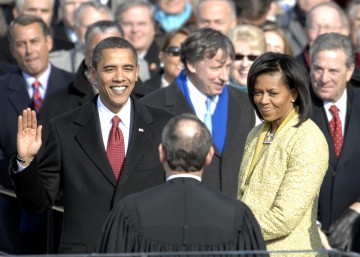Editor’s Note – The Dream Act passes – by executive fiat. If the idea was sound, and if it only needed a policy enforcement change, he would have done so. The problem is, he announced it with an Executive Order. The only conclusion is it was an election season move. He has completed ignored his oath of office, again, and this move does so much damage, and is so illegal, and unconstitutional.
If it was a good idea it would have gone through Congress, but even his own party’s members would not pass the so-called Dream Act. If it was such a good idea, why did it take three and a half years? Again, this man will say and do anything to get re-elected – even if it means making the economy for all Americans tougher. The young are already struggling, now they have another wall in front of them while seeking employment, at any level.

Why bother taking the oath of office? Since he did, he threw it out the window along with the Constitution anyway! So Faithfully Executing...
When will America see through this reprobate? That oath only mattered in 2009, when they did it twice to achieve legal status, now its just a bunch of words, unworthy of his second thought. Just like the way he treats the Constitution – as if it were just another piece of paper.
Below this article is an amazing video from a series, this one directly addressing Obama’s actions on Friday.
The story behind Obama’s immigration order
By Brian Bennett and Christi Parsons
Gathered around a conference table one day in late April, Democratic senators had a specific request for White House aides: take a closer look at using executive power to shield young illegal immigrants from deportation.
One week earlier, Sen. Marco Rubio (R-Fla.) had told reporters about his plans to propose a scaled-back version of the Dream Act -– legislation designed to provide help to young immigrants. Democrats were skeptical that Rubio could gain his own party’s support for that idea. But seated in the big conference room next to Senate Majority Leader Harry Reid‘s office, the senators pressed aides to the president to do more.
The White House officials responded that the Department of Homeland Security already had been discussing how to refine its deportation practices so officials could focus on the most serious cases.
The idea, they believed, had merit.
Over the next several weeks, administration officials reexamined the issue, diving into the legal precedents governing the president’s authority over immigration enforcement.
Since the second year of the administration, officials at the Department of Homeland Security, which oversees immigration enforcement, had operated on the understanding that, even without Congress overhauling immigration policy, executive officials could make certain decisions on a case-by-case basis when carrying out deportation law.
They knew the standard Obama and his top aides would apply. The president, a constitutional lawyer, believed that creating a special class of people entitled to particular rights was something only Congress could do. At the same time, however, if prosecutors could agree on how to exercise their judgment on a case-by-case basis, without any guarantees, that would be permissible as part of their discretionary power, according to a senior administration official familiar with the decision.
The White House had accepted that principle in two legal memos, one written in 2010 and the other in 2011, which underscored the leeway agency officials had on when to pursue a case and when to drop it.
The sheer volume of cases means the government can’t prosecute every single violator of immigration law, said one senior administration official, so enforcement agencies always have to pick and choose which cases to pursue based on the seriousness of each one.
This spring, officials considered how that principle could be applied to help the young immigrants who would be covered by the proposed Dream Act or, as the president had begun to call them, “the dreamers.”
By early June, Homeland Security officials had come up with criteria that would target the right population: young people who had been brought to this country before they turned 16, and whose promise and loyalty the country could least afford to lose.
Aides did not say when Homeland Security Secretary Janet Napolitano signed off on the idea, but they said the policy was substantially completed by the beginning of June.
The announcement this week comes after a tough run of luck for Obama, as he struggles to persuade Americans to stick with his economic plans despite dismal jobs figures.
He is also preparing to speak next week to NALEO, the national association of elected and appointed Latino leaders, amid a presidential race that will turn in part on whom Latino voters support.
_______________________________

